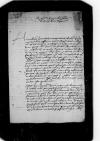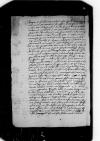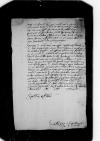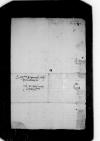Quanto maerore me affecerit mors magnifici domini Alfonso de Valdés (Alphonsus Valdesius) (*1500-1504 – †1532), Spanish humanist, friend of Erasmus of Rotterdam, brother of Juan and Diego; from 1520 in the service of the Imperial Chancellor Mercurino Gattinara; 1522 secretary of Emperor Charles V of Habsburg; 1526 Latin secretary (FERNÁNDEZ-SANTAMARÍA, p. 38-48; DE VOCHT 1961, p. 26)⌊ValdesiiAlfonso de Valdés (Alphonsus Valdesius) (*1500-1504 – †1532), Spanish humanist, friend of Erasmus of Rotterdam, brother of Juan and Diego; from 1520 in the service of the Imperial Chancellor Mercurino Gattinara; 1522 secretary of Emperor Charles V of Habsburg; 1526 Latin secretary (FERNÁNDEZ-SANTAMARÍA, p. 38-48; DE VOCHT 1961, p. 26)⌋, cum ob eam animorum arctissimam inter nos coniunctionem, tum etiam, quod illum bonum et fidelem servitorem rerum Serenissimae Maiestatis Vestrae in aula Charles V of Habsburg (*1500 – †1558), ruler of the Burgundian territories (1506-1555), King of Spain as Charles I (1516-1556), King of Naples and Sicily, King of the Romans (1519-1530), Holy Roman Emperor of the German Nation (elected 1519, crowned 1530, abdicated 1556); son of Philip I the Handsome and Joanna the Mad of Castile⌊caesarisCharles V of Habsburg (*1500 – †1558), ruler of the Burgundian territories (1506-1555), King of Spain as Charles I (1516-1556), King of Naples and Sicily, King of the Romans (1519-1530), Holy Roman Emperor of the German Nation (elected 1519, crowned 1530, abdicated 1556); son of Philip I the Handsome and Joanna the Mad of Castile⌋ reliqueram, scribi a me nequit. cf. Vulg. Gn 6.13 ⌊Haec est via carnis omnibuscf. Vulg. Gn 6.13 ⌋. Confeceram iam longas ad Charles V of Habsburg (*1500 – †1558), ruler of the Burgundian territories (1506-1555), King of Spain as Charles I (1516-1556), King of Naples and Sicily, King of the Romans (1519-1530), Holy Roman Emperor of the German Nation (elected 1519, crowned 1530, abdicated 1556); son of Philip I the Handsome and Joanna the Mad of Castile⌊illumCharles V of Habsburg (*1500 – †1558), ruler of the Burgundian territories (1506-1555), King of Spain as Charles I (1516-1556), King of Naples and Sicily, King of the Romans (1519-1530), Holy Roman Emperor of the German Nation (elected 1519, crowned 1530, abdicated 1556); son of Philip I the Handsome and Joanna the Mad of Castile⌋ et ad alios apud caesarem litteras voluique illas per proprium mittere nuntium, sed morte Alfonso de Valdés (Alphonsus Valdesius) (*1500-1504 – †1532), Spanish humanist, friend of Erasmus of Rotterdam, brother of Juan and Diego; from 1520 in the service of the Imperial Chancellor Mercurino Gattinara; 1522 secretary of Emperor Charles V of Habsburg; 1526 Latin secretary (FERNÁNDEZ-SANTAMARÍA, p. 38-48; DE VOCHT 1961, p. 26)⌊amiciAlfonso de Valdés (Alphonsus Valdesius) (*1500-1504 – †1532), Spanish humanist, friend of Erasmus of Rotterdam, brother of Juan and Diego; from 1520 in the service of the Imperial Chancellor Mercurino Gattinara; 1522 secretary of Emperor Charles V of Habsburg; 1526 Latin secretary (FERNÁNDEZ-SANTAMARÍA, p. 38-48; DE VOCHT 1961, p. 26)⌋ consternatus et litteras proieci et nuntium non misi, quousque Serenissima Maiestas Vestra me edoceat, cum ista per mortem facta est mutatio, quid et quibus per me vult scribi. Alfonso de Valdés (Alphonsus Valdesius) (*1500-1504 – †1532), Spanish humanist, friend of Erasmus of Rotterdam, brother of Juan and Diego; from 1520 in the service of the Imperial Chancellor Mercurino Gattinara; 1522 secretary of Emperor Charles V of Habsburg; 1526 Latin secretary (FERNÁNDEZ-SANTAMARÍA, p. 38-48; DE VOCHT 1961, p. 26)⌊Eo amicoAlfonso de Valdés (Alphonsus Valdesius) (*1500-1504 – †1532), Spanish humanist, friend of Erasmus of Rotterdam, brother of Juan and Diego; from 1520 in the service of the Imperial Chancellor Mercurino Gattinara; 1522 secretary of Emperor Charles V of Habsburg; 1526 Latin secretary (FERNÁNDEZ-SANTAMARÍA, p. 38-48; DE VOCHT 1961, p. 26)⌋ amisso, licet alios adhuc non paucos ibi habeam, animus meus ab illa curia decidit. Nihilominus quicquid Serenissima Maiestas Vestra mihi mandaverit, cf. Verg. A. II 708 ⌊ipse subibo umeris nec me labor iste gravabitcf. Verg. A. II 708 ⌋.
Serenissima et Clementissima Domina mea. Dederat mihi Serenissima Maiestas Vestra per postulationem suam a reverendissimo Mauritius Ferber (*1471 – †1537), doctor of both canon and civil law; from 1507 Canon of Ermland (Warmia) and Lübeck; from 1514 Canon of Trier; 1512-1515 parish priest of the Church of Saints Peter and Paul in Gdańsk (Danzig); from 1516 Custos of Ermland and parish priest of the Church of the Blessed Virgin Mary in Gdańsk; from 1519 Canon of Dorpat; from 1523 Canon of Revel; 1523-1537 Bishop of Ermland (KOPICZKO 2, p. 71-72; SBKW, p. 59-60)⌊domino VarmiensiMauritius Ferber (*1471 – †1537), doctor of both canon and civil law; from 1507 Canon of Ermland (Warmia) and Lübeck; from 1514 Canon of Trier; 1512-1515 parish priest of the Church of Saints Peter and Paul in Gdańsk (Danzig); from 1516 Custos of Ermland and parish priest of the Church of the Blessed Virgin Mary in Gdańsk; from 1519 Canon of Dorpat; from 1523 Canon of Revel; 1523-1537 Bishop of Ermland (KOPICZKO 2, p. 71-72; SBKW, p. 59-60)⌋ in mense illius vacantem tunc canonicatum Varmiensem, quem ego Bologna (Bononia), city in Italy at the southern end of the plain of the Po valley, between 1506 and 1860 it belonged to the Papal State⌊BononiaeBologna (Bononia), city in Italy at the southern end of the plain of the Po valley, between 1506 and 1860 it belonged to the Papal State⌋, si affectus forsan fuerat, liberum a Clement VII (Giulio de' Medici) (*1478 – †1534), 1523-1534 Pope⌊pontificeClement VII (Giulio de' Medici) (*1478 – †1534), 1523-1534 Pope⌋ sum assecutus et inter alia beneficia per pontificis indultum mihi est reservatus atque a me hucusque possessus. Cum vero paulo ante tractari est superinscribed⌈estest superinscribed⌉ coeptum de coadiutore Varmiensi, quo ego fortassis excluderer, ne talis praeficeretur, qui serenissimae Sigismund I Jagiellon (Zygmunt I) (*1467 – †1548), King of Poland and Grand Duke of Lithuania (1506-1548); Duke of Głogów (Glogau) (1499-1506), Duke of Opava (1501-1506), Governor of Silesia (1504-1506); son of King Kazimierz IV Jagiellon and Elisabeth of Austria⌊maiestati
 BNW BOZ TG 15 nr 1711, f. 24v
regiaeSigismund I Jagiellon (Zygmunt I) (*1467 – †1548), King of Poland and Grand Duke of Lithuania (1506-1548); Duke of Głogów (Glogau) (1499-1506), Duke of Opava (1501-1506), Governor of Silesia (1504-1506); son of King Kazimierz IV Jagiellon and Elisabeth of Austria⌋ et fidus, et gratus esset, quod illi canonici magna cura praecaverunt semper, surrexit quidam inter eos Alexander Sculteti (Scholtcze) (*ca. 1485 – †1570), doctor of canon law, cartographer, historian and friend of Copernicus; accused by Dantiscus and Stanisław Hozjusz (Hosius) of Sacramentarian heresy, in 1540 banished by King Sigismund I Jagiellon; in 1541 imprisoned by the Inquisition in Rome; after release from prison in 1544 he stayed in Rome for the rest of his life; 1509-1516 notary at the Roman Curia; 1519-1541 Canon of Ermland (Warmia), 1530-1539 Chancellor of the Ermland Chapter; 1536-1538 administrator of the komornictwo of Mehlsack (Melzak, today Pieniężno) (KOPICZKO 2, p. 299; SBKW, p. 219-220)⌊Alexander ScultetiAlexander Sculteti (Scholtcze) (*ca. 1485 – †1570), doctor of canon law, cartographer, historian and friend of Copernicus; accused by Dantiscus and Stanisław Hozjusz (Hosius) of Sacramentarian heresy, in 1540 banished by King Sigismund I Jagiellon; in 1541 imprisoned by the Inquisition in Rome; after release from prison in 1544 he stayed in Rome for the rest of his life; 1509-1516 notary at the Roman Curia; 1519-1541 Canon of Ermland (Warmia), 1530-1539 Chancellor of the Ermland Chapter; 1536-1538 administrator of the komornictwo of Mehlsack (Melzak, today Pieniężno) (KOPICZKO 2, p. 299; SBKW, p. 219-220)⌋, qui Rome (Roma), city in central Italy, on the Tiber river, seat of the Holy See⌊RomaeRome (Roma), city in central Italy, on the Tiber river, seat of the Holy See⌋ quandam tabernam publicam et ea, quae illam concernebant, satis diu fovebat et me suis technis Romanistis turbare et canonicatu mihi per Serenissimam Maiestatem Vestram concesso privare contendit, prius etiam me bis ex nominationibus serenissimae Sigismund I Jagiellon (Zygmunt I) (*1467 – †1548), King of Poland and Grand Duke of Lithuania (1506-1548); Duke of Głogów (Glogau) (1499-1506), Duke of Opava (1501-1506), Governor of Silesia (1504-1506); son of King Kazimierz IV Jagiellon and Elisabeth of Austria⌊regiae maiestatisSigismund I Jagiellon (Zygmunt I) (*1467 – †1548), King of Poland and Grand Duke of Lithuania (1506-1548); Duke of Głogów (Glogau) (1499-1506), Duke of Opava (1501-1506), Governor of Silesia (1504-1506); son of King Kazimierz IV Jagiellon and Elisabeth of Austria⌋ per mentales reservationes cum magno meo dispendio eiecit et in ea persecutione contra me, nullo umquam verbo vel re minima a me laesus, perseverat. Quod Sacrae Maiestati Vestrae, quae collatrix mea est benignissima, non sine magno animi dolore conqueror ms. conquerer(!)
⌈conquerorconqueror ms. conquerer(!)
⌉, conquestus etiam sacrae Sigismund I Jagiellon (Zygmunt I) (*1467 – †1548), King of Poland and Grand Duke of Lithuania (1506-1548); Duke of Głogów (Glogau) (1499-1506), Duke of Opava (1501-1506), Governor of Silesia (1504-1506); son of King Kazimierz IV Jagiellon and Elisabeth of Austria⌊maiestati regiaeSigismund I Jagiellon (Zygmunt I) (*1467 – †1548), King of Poland and Grand Duke of Lithuania (1506-1548); Duke of Głogów (Glogau) (1499-1506), Duke of Opava (1501-1506), Governor of Silesia (1504-1506); son of King Kazimierz IV Jagiellon and Elisabeth of Austria⌋ per litteras meas.
BNW BOZ TG 15 nr 1711, f. 24v
regiaeSigismund I Jagiellon (Zygmunt I) (*1467 – †1548), King of Poland and Grand Duke of Lithuania (1506-1548); Duke of Głogów (Glogau) (1499-1506), Duke of Opava (1501-1506), Governor of Silesia (1504-1506); son of King Kazimierz IV Jagiellon and Elisabeth of Austria⌋ et fidus, et gratus esset, quod illi canonici magna cura praecaverunt semper, surrexit quidam inter eos Alexander Sculteti (Scholtcze) (*ca. 1485 – †1570), doctor of canon law, cartographer, historian and friend of Copernicus; accused by Dantiscus and Stanisław Hozjusz (Hosius) of Sacramentarian heresy, in 1540 banished by King Sigismund I Jagiellon; in 1541 imprisoned by the Inquisition in Rome; after release from prison in 1544 he stayed in Rome for the rest of his life; 1509-1516 notary at the Roman Curia; 1519-1541 Canon of Ermland (Warmia), 1530-1539 Chancellor of the Ermland Chapter; 1536-1538 administrator of the komornictwo of Mehlsack (Melzak, today Pieniężno) (KOPICZKO 2, p. 299; SBKW, p. 219-220)⌊Alexander ScultetiAlexander Sculteti (Scholtcze) (*ca. 1485 – †1570), doctor of canon law, cartographer, historian and friend of Copernicus; accused by Dantiscus and Stanisław Hozjusz (Hosius) of Sacramentarian heresy, in 1540 banished by King Sigismund I Jagiellon; in 1541 imprisoned by the Inquisition in Rome; after release from prison in 1544 he stayed in Rome for the rest of his life; 1509-1516 notary at the Roman Curia; 1519-1541 Canon of Ermland (Warmia), 1530-1539 Chancellor of the Ermland Chapter; 1536-1538 administrator of the komornictwo of Mehlsack (Melzak, today Pieniężno) (KOPICZKO 2, p. 299; SBKW, p. 219-220)⌋, qui Rome (Roma), city in central Italy, on the Tiber river, seat of the Holy See⌊RomaeRome (Roma), city in central Italy, on the Tiber river, seat of the Holy See⌋ quandam tabernam publicam et ea, quae illam concernebant, satis diu fovebat et me suis technis Romanistis turbare et canonicatu mihi per Serenissimam Maiestatem Vestram concesso privare contendit, prius etiam me bis ex nominationibus serenissimae Sigismund I Jagiellon (Zygmunt I) (*1467 – †1548), King of Poland and Grand Duke of Lithuania (1506-1548); Duke of Głogów (Glogau) (1499-1506), Duke of Opava (1501-1506), Governor of Silesia (1504-1506); son of King Kazimierz IV Jagiellon and Elisabeth of Austria⌊regiae maiestatisSigismund I Jagiellon (Zygmunt I) (*1467 – †1548), King of Poland and Grand Duke of Lithuania (1506-1548); Duke of Głogów (Glogau) (1499-1506), Duke of Opava (1501-1506), Governor of Silesia (1504-1506); son of King Kazimierz IV Jagiellon and Elisabeth of Austria⌋ per mentales reservationes cum magno meo dispendio eiecit et in ea persecutione contra me, nullo umquam verbo vel re minima a me laesus, perseverat. Quod Sacrae Maiestati Vestrae, quae collatrix mea est benignissima, non sine magno animi dolore conqueror ms. conquerer(!)
⌈conquerorconqueror ms. conquerer(!)
⌉, conquestus etiam sacrae Sigismund I Jagiellon (Zygmunt I) (*1467 – †1548), King of Poland and Grand Duke of Lithuania (1506-1548); Duke of Głogów (Glogau) (1499-1506), Duke of Opava (1501-1506), Governor of Silesia (1504-1506); son of King Kazimierz IV Jagiellon and Elisabeth of Austria⌊maiestati regiaeSigismund I Jagiellon (Zygmunt I) (*1467 – †1548), King of Poland and Grand Duke of Lithuania (1506-1548); Duke of Głogów (Glogau) (1499-1506), Duke of Opava (1501-1506), Governor of Silesia (1504-1506); son of King Kazimierz IV Jagiellon and Elisabeth of Austria⌋ per litteras meas.
Supplico igitur Sacrae Maiestati Vestrae, velit hanc ignominiam auctoritati Sacrae Maiestatis Vestrae et meritis meis illatam serio apud se perpendere et reverendissimo Mauritius Ferber (*1471 – †1537), doctor of both canon and civil law; from 1507 Canon of Ermland (Warmia) and Lübeck; from 1514 Canon of Trier; 1512-1515 parish priest of the Church of Saints Peter and Paul in Gdańsk (Danzig); from 1516 Custos of Ermland and parish priest of the Church of the Blessed Virgin Mary in Gdańsk; from 1519 Canon of Dorpat; from 1523 Canon of Revel; 1523-1537 Bishop of Ermland (KOPICZKO 2, p. 71-72; SBKW, p. 59-60)⌊domino episcopoMauritius Ferber (*1471 – †1537), doctor of both canon and civil law; from 1507 Canon of Ermland (Warmia) and Lübeck; from 1514 Canon of Trier; 1512-1515 parish priest of the Church of Saints Peter and Paul in Gdańsk (Danzig); from 1516 Custos of Ermland and parish priest of the Church of the Blessed Virgin Mary in Gdańsk; from 1519 Canon of Dorpat; from 1523 Canon of Revel; 1523-1537 Bishop of Ermland (KOPICZKO 2, p. 71-72; SBKW, p. 59-60)⌋, quem huius rei expertem scio, Ermland Chapter cathedral chapter based in Frauenburg (Frombork, Varmia)⌊capituloque VarmiensiErmland Chapter cathedral chapter based in Frauenburg (Frombork, Varmia)⌋ serio scribere, ut Alexander Sculteti (Scholtcze) (*ca. 1485 – †1570), doctor of canon law, cartographer, historian and friend of Copernicus; accused by Dantiscus and Stanisław Hozjusz (Hosius) of Sacramentarian heresy, in 1540 banished by King Sigismund I Jagiellon; in 1541 imprisoned by the Inquisition in Rome; after release from prison in 1544 he stayed in Rome for the rest of his life; 1509-1516 notary at the Roman Curia; 1519-1541 Canon of Ermland (Warmia), 1530-1539 Chancellor of the Ermland Chapter; 1536-1538 administrator of the komornictwo of Mehlsack (Melzak, today Pieniężno) (KOPICZKO 2, p. 299; SBKW, p. 219-220)⌊istumAlexander Sculteti (Scholtcze) (*ca. 1485 – †1570), doctor of canon law, cartographer, historian and friend of Copernicus; accused by Dantiscus and Stanisław Hozjusz (Hosius) of Sacramentarian heresy, in 1540 banished by King Sigismund I Jagiellon; in 1541 imprisoned by the Inquisition in Rome; after release from prison in 1544 he stayed in Rome for the rest of his life; 1509-1516 notary at the Roman Curia; 1519-1541 Canon of Ermland (Warmia), 1530-1539 Chancellor of the Ermland Chapter; 1536-1538 administrator of the komornictwo of Mehlsack (Melzak, today Pieniężno) (KOPICZKO 2, p. 299; SBKW, p. 219-220)⌋, non Macedonem Alexandrum, sed rabulam, a concepto contineant, vel potius effici, ut in exemplum aliorum ... in castro Marienburgensi cum pane contritionis certo tempore, quo a furore ad sanitatem redeat, castigetur, ne id per huius hominis malignitatem amittam, quod tanto labore, curis et dispendio a Sacra Maiestate Vestra sum assecutus. Posset etiam sacra Sigismund I Jagiellon (Zygmunt I) (*1467 – †1548), King of Poland and Grand Duke of Lithuania (1506-1548); Duke of Głogów (Glogau) (1499-1506), Duke of Opava (1501-1506), Governor of Silesia (1504-1506); son of King Kazimierz IV Jagiellon and Elisabeth of Austria⌊maiestas regiaSigismund I Jagiellon (Zygmunt I) (*1467 – †1548), King of Poland and Grand Duke of Lithuania (1506-1548); Duke of Głogów (Glogau) (1499-1506), Duke of Opava (1501-1506), Governor of Silesia (1504-1506); son of King Kazimierz IV Jagiellon and Elisabeth of Austria⌋, modo vellet, hanc Ermland (Warmia, Varmia), diocese and ecclesiastical principality in northeastern Poland, 1466-1772 within the Kingdom of Poland, Royal Prussia⌊ecclesiam VarmiensemErmland (Warmia, Varmia), diocese and ecclesiastical principality in northeastern Poland, 1466-1772 within the Kingdom of Poland, Royal Prussia⌋, quae sola permittitur libera uti electione, quemadmodum omnes alias in Poland (Kingdom of Poland, Polonia)⌊RegnoPoland (Kingdom of Poland, Polonia)⌋, Lithuania⌊Magno DucatuLithuania⌋ et hanc Kulm diocese (Chełmno diocese)⌊meam ecclesiamKulm diocese (Chełmno diocese)⌋ digno, cui vellet, conferre neque magna subest causa, cur fieri non deberet. Nulla alia enim re se defendit quam imperatoria bulla, quae nullam vim in subditis serenissimae Sigismund I Jagiellon (Zygmunt I) (*1467 – †1548), King of Poland and Grand Duke of Lithuania (1506-1548); Duke of Głogów (Glogau) (1499-1506), Duke of Opava (1501-1506), Governor of Silesia (1504-1506); son of King Kazimierz IV Jagiellon and Elisabeth of Austria⌊maiestatis regiaeSigismund I Jagiellon (Zygmunt I) (*1467 – †1548), King of Poland and Grand Duke of Lithuania (1506-1548); Duke of Głogów (Glogau) (1499-1506), Duke of Opava (1501-1506), Governor of Silesia (1504-1506); son of King Kazimierz IV Jagiellon and Elisabeth of Austria⌋ et eiusdem dominiis habere potest vel debet. Si aliis ecclesiis derogatum est, cur ista sola maneret immunis?
 BNW BOZ TG 15 nr 1711, f. 25r
Sicque non fierent episcopi, qui numquam vel viderunt, vel text damaged⌈[vel]vel text damaged⌉ servierunt regi, sicut his annis contigit habuitque igitur in novissimo Pruteno bello Sigismund I Jagiellon (Zygmunt I) (*1467 – †1548), King of Poland and Grand Duke of Lithuania (1506-1548); Duke of Głogów (Glogau) (1499-1506), Duke of Opava (1501-1506), Governor of Silesia (1504-1506); son of King Kazimierz IV Jagiellon and Elisabeth of Austria⌊maiestas regiaSigismund I Jagiellon (Zygmunt I) (*1467 – †1548), King of Poland and Grand Duke of Lithuania (1506-1548); Duke of Głogów (Glogau) (1499-1506), Duke of Opava (1501-1506), Governor of Silesia (1504-1506); son of King Kazimierz IV Jagiellon and Elisabeth of Austria⌋ non text damaged⌈[non]non text damaged⌉ parvas difficultates, fidem episcopi, prius sibi ignoti text damaged⌈[i]i text damaged⌉, emere coacta etc. Ista non in hoc scribo, ut alicuius bonae famae officerem, sed ut Sacra Maiestas Vestra, quomodo haec habeant, clarius cognoscat.
BNW BOZ TG 15 nr 1711, f. 25r
Sicque non fierent episcopi, qui numquam vel viderunt, vel text damaged⌈[vel]vel text damaged⌉ servierunt regi, sicut his annis contigit habuitque igitur in novissimo Pruteno bello Sigismund I Jagiellon (Zygmunt I) (*1467 – †1548), King of Poland and Grand Duke of Lithuania (1506-1548); Duke of Głogów (Glogau) (1499-1506), Duke of Opava (1501-1506), Governor of Silesia (1504-1506); son of King Kazimierz IV Jagiellon and Elisabeth of Austria⌊maiestas regiaSigismund I Jagiellon (Zygmunt I) (*1467 – †1548), King of Poland and Grand Duke of Lithuania (1506-1548); Duke of Głogów (Glogau) (1499-1506), Duke of Opava (1501-1506), Governor of Silesia (1504-1506); son of King Kazimierz IV Jagiellon and Elisabeth of Austria⌋ non text damaged⌈[non]non text damaged⌉ parvas difficultates, fidem episcopi, prius sibi ignoti text damaged⌈[i]i text damaged⌉, emere coacta etc. Ista non in hoc scribo, ut alicuius bonae famae officerem, sed ut Sacra Maiestas Vestra, quomodo haec habeant, clarius cognoscat.
Scripsi Sacrae Maiestati Vestrae novissime, rogans absolutionem a sacra Sigismund I Jagiellon (Zygmunt I) (*1467 – †1548), King of Poland and Grand Duke of Lithuania (1506-1548); Duke of Głogów (Glogau) (1499-1506), Duke of Opava (1501-1506), Governor of Silesia (1504-1506); son of King Kazimierz IV Jagiellon and Elisabeth of Austria⌊maiestate regiaSigismund I Jagiellon (Zygmunt I) (*1467 – †1548), King of Poland and Grand Duke of Lithuania (1506-1548); Duke of Głogów (Glogau) (1499-1506), Duke of Opava (1501-1506), Governor of Silesia (1504-1506); son of King Kazimierz IV Jagiellon and Elisabeth of Austria⌋ per duos annos, quibus me explicare debitis possem, ab officiis et muniis publicis, quod ut mihi Sacra Maiestas Vestra impetret, iterum atque iterum humillime peto. Vix puto, quod ad Provincial Diet of Royal Prussia ⌊conventum GraudnicensemProvincial Diet of Royal Prussia ⌋ venire potero, adeo, ut reor, otium et quies insolita pedem meum exulceravit neque spero sacram Sigismund I Jagiellon (Zygmunt I) (*1467 – †1548), King of Poland and Grand Duke of Lithuania (1506-1548); Duke of Głogów (Glogau) (1499-1506), Duke of Opava (1501-1506), Governor of Silesia (1504-1506); son of King Kazimierz IV Jagiellon and Elisabeth of Austria⌊maiestatem regiamSigismund I Jagiellon (Zygmunt I) (*1467 – †1548), King of Poland and Grand Duke of Lithuania (1506-1548); Duke of Głogów (Glogau) (1499-1506), Duke of Opava (1501-1506), Governor of Silesia (1504-1506); son of King Kazimierz IV Jagiellon and Elisabeth of Austria⌋ aegre laturam, si iam tandem salutis et valetudinis meae, quam toties in Maiestatum Vestrarum servitio posui in periculum, rationem habuero, quamdiu hoc, quod vitae reliquum est, Deus concesserit, qui Sacram Maiestatem Vestram quam diutissime sospitet et prosperet in omnibus meque humillime cum hoc canonicatu, quem mihi contulit, Sacrae Maiestati Vestrae, ut Dominae meae clementissimae, commendo.
 BNW BOZ TG 15 nr 1711, f. 24v
regiae
BNW BOZ TG 15 nr 1711, f. 24v
regiae BNW BOZ TG 15 nr 1711, f. 25r
Sicque non fierent episcopi, qui numquam vel viderunt, vel text damaged⌈[vel]vel text damaged⌉ servierunt regi, sicut his annis contigit habuitque igitur in novissimo Pruteno bello
BNW BOZ TG 15 nr 1711, f. 25r
Sicque non fierent episcopi, qui numquam vel viderunt, vel text damaged⌈[vel]vel text damaged⌉ servierunt regi, sicut his annis contigit habuitque igitur in novissimo Pruteno bello 


